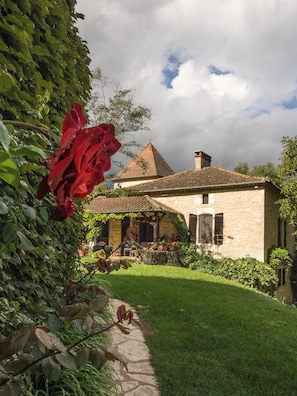The Domaine du Pécou, a character farm dating from 1799, sits on the edge of a vast wooded area and is set among the vineyards of Cahors. The house, built in ashlar as usual in Quercey, is completely restored and equipped with every comfort. It is surrounded by about 15 hectares of private land, three quarters of which are fenced. In this enclosure you will find the house, the annex, the barn, the swimming pool and the garden. Next to it is a two hectare fenced plot for our small flock of sheep.
You can enter the fenced plot via an electrically open barrier. The private swimming pool, open from June until and including October, is located under cover and protected from passers-by; that's why we lost the habit of putting on the swimsuit. Barbecue is possible in the original restored oven.
Around
The house (Domaine du Pécou) is in the Lot, a department in the south-west of France. A magnificent region, it is a slate plateau covered mainly with oaks which is crossed by the Dordogne, the Célé and the Lot.
You will get to know not only the beauty of nature, but also the history of mankind from prehistoric times to the present. Everywhere you will find silent witnesses such as prehistoric cave paintings, Celtic tombs (dolmen), Gallic fortifications, Roman art, medieval bastides (small fortified towns), cloisters and castles. During the Hundred Years War the region suffered greatly from the battles between the French and English armies. During this period many country houses were built.
The Domaine du Pécou is 5 minutes from the magnificent old town of Puy L’Évêque and half an hour from the town of Cahors, the capital of the Lot department where you can eat deliciously like everywhere in the region.
In Puy L’Évêque there are restaurants, a butcher, two bakeries and a supermarket. In the area you will find so many possibilities for hiking, swimming, rowing and horse riding. So if necessary you can also lose the calories taken.
The owners
In 1978 we, Lank Bos and Coos Huijsen, immediately fell in love with the house, its splendid surroundings and its wonderful intimacy and since that time we have been the happy owners. Each year we came back several times. For those interested: the house plays a role in homo-literature. Frans Kellendonk worked on his novel De Nietsnut (1979) when he stayed in Pécou and he mentioned his stay in his correspondence. Coos worked and still works on his books and articles. Pécou and the reaction of the population to its inhabitants are described in L’Homo Politicus (Amsterdam, 2015).




